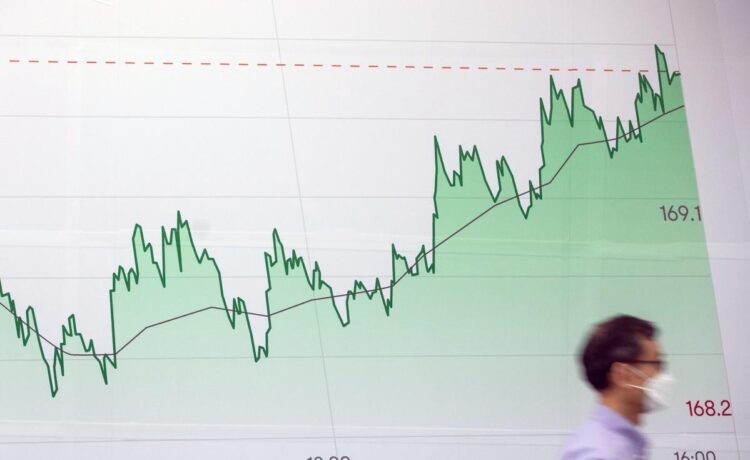(Bloomberg) — A rout in Chinese stocks listed in Hong Kong intensified Monday, pushing their discount to mainland peers to the deepest in fifteen years in the latest sign of growing pessimism among international investors.
Most Read from Bloomberg
The Hang Seng China Enterprises Index fell 2.4%, inching closer to a level last seen almost two decades ago, while the onshore benchmark CSI 300 Index finished 1.6% lower. As a result, a gauge tracking mainland stocks’ price gaps versus their dual listings in Hong Kong reached the widest since 2009 — implying a 36% discount for the offshore market.
The steeper losses in Hong Kong, where some of China’s most influential and innovative firms are listed and Beijing’s interference is less felt, paint a more worrisome picture of global investor sentiment toward the world’s No. 2 economy. Signs of government intervention to prop up the mainland market have increased in recent weeks as selling pressure continued despite a more optimistic Wall Street, where the S&P 500 Index climbed to a record on Friday.
A confluence of factors have been behind the seemingly endless selloff in Chinese shares, ranging from a deepening housing slump to stubborn deflationary pressures, as well as uncertainties about the trajectory of US interest rates. Chinese commercial lenders’ latest move to keep their benchmark lending rates unchanged, which followed the central bank’s recent decision to maintain borrowing costs, may also have disappointed investors hoping for more aggressive stimulus.
“Quite a large number of H share investors are overseas institutional funds and they have reallocated from Hong Kong to Japan and other Asian markets in their Asian allocation,” said Redmond Wong, market strategist at Saxo Capital Markets HK Ltd., referring to Hong Kong-listed stocks. “Some mainland institutional investors may have more restrictions on how much they can unload and they also tend to have a home bias.”
Chinese stocks listed in Hong Kong are often regarded as a better barometer of the health of the world’s second-largest economy and a more accurate gauge of broader investor sentiment. In comparison, trading in Shanghai and Shenzhen is constantly under the influence of meddling by Chinese regulators, from restrictions on anything from short selling or initial public offerings to verbal warnings and direct intervention by state funds.
The HSCEI was a little over 1% away from dropping to the lowest since 2005 and Hong Kong’s benchmark Hang Seng Index also inched closer to a level unseen since 2009. The biggest drags on Monday included Chinese tech behemoths Meituan and Tencent Holdings Ltd., as well as electric vehicle makers Li Auto Inc. and and BYD Co.
The latest declines may be attributable to “a lack of catalysts in the near term and outflows to more attractive alternatives in the region,” said Marvin Chen, a Bloomberg Intelligence analyst. “Global markets have been surging on the chip sector, and this is an area where China and the rest of the world may run on separate tracks due to geopolitical tensions.”
The mood is similarly fragile in the mainland Chinese market, where the benchmark CSI 300 has hit a new low in five years.
The slump once again coincided with a jump in turnover on a handful of exchange-traded funds tracking the key indexes, a sign that state-led buying may be behind the unusual spike.
The deepening rout is adding pressure on a massive amount of so-called snowball derivatives, which are structured products that promise bond-like coupons as long as the underlying assets trade within a certain range. The CSI Smallcap 500 Index, a pricing reference for some of these products, slipped 4.7% on Monday, taking it below an earlier estimated threshold that may trigger widespread losses on the snowballs.
Less than a month into the new year, the gauge of Chinese stocks listed in Hong Kong has already lost 13%, making it the worst-performing major benchmark in global indexes. In comparison, the S&P 500 has gained 1.5%.
READ MORE: China’s $6.3 Trillion Stock Rout Getting Uglier by the Day
The benefits of monetary easing by the People’s Bank of China have already been priced in and “punchier” policies are needed to revive stocks, Eva Lee, head of Greater China equities at UBS Global Wealth Management, said at a briefing Friday.
(Updates with details on price gap between mainland and Hong Kong shares)
Most Read from Bloomberg Businessweek
©2024 Bloomberg L.P.














